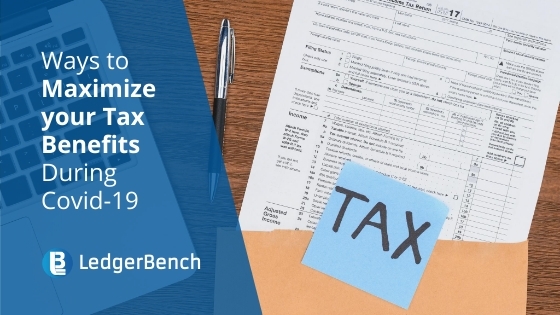
Accountants, Important Dates, Tax, Tax Calender
Covid-19 has brought the economy to a halt. The global Lockdown have made it almost impossible to churn the vehicles of the economy and its revival in the future is also something that is dependent on how fast we can fight the pandemic. The IRS has come to the taxpayer’s rescue and has come out with a series of benefits, protective regulations and tax relaxations to ease everyone during these times of uncertainty.
Predominantly, all the tax deadlines that were pending for the financial year 2019 and were falling from April 1- July 15, have been extended to July 15, 2020. A list of relieving measures have since been taken to reduce stress and financial burdens during Covid-19. Additionally, individuals who still cannot adhere to the July 15th Deadline can again ask for extensions from the Department of Treasury and the IRS.
Who All Are Eligible for the New Tax Deadlines?
The new tax deadlines are applicable to all taxpayers, whether they are individuals, freelancers or filing for self-employment taxes. These umbrella relieving measures are applicable to everyone. There is no need to file for the acceptance of this relaxation of deadlines. All the taxpayers are automatically eligible for these new IRS tax relaxation deadlines.
You May Also Read – Ways to Maximize your Tax Benefits During Covid-19
Does This Relaxation Depend on All the Taxes?
Almost all the IRS tax deadlines that fell under the umbrella dates of April 1- July 15 have been an extended relaxation date till July 15. Although, it is important to note that there are differences in how the different states have responded to these IRS deadlines. Here are those below:
| Arizona, Arkansas, Connecticut |
Announced plans to end this year’s regular legislative session. |
| Arizona, Connecticut |
Announced Special Sessions to Be Held at the End of the Year. |
| California, Delaware, Kansas, Maryland |
New Revenue Forecasts Have Been Announced in These States. |
| Colorado, Minnesota |
April sales tax deadlines have been extended to May. |
| Arkansas |
The Budget for the Financial Year 2021 has been Proposed. |
| Illinois |
Legislative Administration Has Further Been Postponed. |
| Kansas |
Veto Power Has Been Postponed Indefinitely. |
| Missouri |
Spending in the Financial Year 2020 Has Been Frozen. |
| New Jersey |
Bill Has Been Enacted to Codify the Income Tax Extension. |
| Oklahoma |
The Board of Equalization has Officially Announced Revenue Shortfalls, and Will Make Use of Any Rainy Budget to Fill the Gaps. |
| Vermont |
Legislators Will Not Be Filing the Budget For Financial Year 2021 Until August or September. |
| Virginia |
Biennial Budget for Financial Year 2021, 2022 Has Been Put in Effect. |
| Washington |
Taxpayers Who Are Applying For a Tax Waiver, May Avoid the Payment of Cannabis and Alcohol Excise Taxes. |
| District of Columbia |
FY 2021 Budget to be Presented on May 12. The Rent Has Been Frozen On Commercial Tenants as Well. |
(All Information Updated As Of April 23, 2020)
How to File For Extension Beyond July 15, 2020?
If you need to file for an extended relaxation that goes beyond the July 15th extension, then you need to follow the steps below.
1. You can seek an extension by filing Form 4868.
2. Businesses who need additional time need to file the form 7004.
Wrapping Up:
The IRS and the Department of Treasury are taking multiple measures to ease citizens and businesses during these times of uncertainty. Tax Relaxation Deadlines to July 15th 2020, is one of the measures to help relax this economic slowdown. The IRS continually comes out with recent updates in the changes that are occurring and any new relief measures that are being taken. You can click here to know more.

Tax
The Covid-19 pandemic has taken the world by a storm. It’s global economic and financial impact is being felt presently, and is estimated to stretch in its effect in the future as well. While the pandemic continues to expand, the IRS is taking sweeping measures to safeguard people and their businesses. The Internal Revenue Services is extending programs with the three principles of working together with people, focused largely on their well being and helping each other and the less fortunate.
With the entire fiasco overlapping with the tax deadlines and important year-end dates, the IRS has taken various measures to ease the period. Here are some tax benefits and strategies you can avail of during the Covid-19 lockdown. The proper usage of which can help your business sail through with minimum effect during this period.
The Four R’s to Safeguard Your Business During Covid-19:
Before you plan your taxes, here is your holy grail to strategize your business logistics today, and make your business Covid-19 secure!
Resolution: The first is to address the problems that your business and workforce are facing immediately due to the virus. Be it, in terms of technology, safety, and your clients.
Resilience: Address the cash management issues that can be faced by the business in the long-term. Preparing right from the start can help you in these times of uncertainty.
Returning: Already start charting a plan of action for your business for the time when it returns to normalcy.
Reimagination: While charting a policy of return, reimagine what the new normal would be. When you apply the idea of what the future can be, you will be able to make better plans and strategies to get you and your business back on track.
Tax Benefits to Avail During Covid-19:
Economic Impact Payments: These are the payments that the IRS is automatically distributing to people within a definite income range. In most cases, there are no actions required by the people in return for the same. Following are the requirements for the Economic Impact Payments:
- If you are a tax paying individual with a gross income of $ 75,000 or a married couple jointly filing taxes with a gross income of $ 150,000; you are eligible to get the entire amount of the economic impact payments.
- This amount is automatically distributed by the IRS on the basis of the tax returns that have been filed either in 2019 or 2018. (Click here for more information)
Employee Retention Credit: With the pandemic raging, the government is urging to retain employer strength, so as to minimize the lay-offs. In the same direction, the IRS has proposed to extend Employee Retention Credit. This is a refundable tax credit of upto 50% for wages paid upto $10,000, for businesses impacted by COVID-19.
- Wages paid after March 12, 2020 to January 1, 2021 will be eligible for the Employee Retention Credit.
- If the employees are less than 100, then whether they are working or non-working, the ERC, will apply for wages upto $10,000.
- If the employees are more than 100, then the ERC will apply only to the working employees with wages upto $10,000. (Click here for more information)
People First Initiative: IRS is trying to be a part of the solution by being in these times together with people and businesses. From extending the tax deadlines to adjusting the consequent compliance actions. The projected start date for the extensions will start from April 1 and will work on till July 15.
- All the installments due to be paid between April 1 to July 15 are suspended. (If preferred so by the individuals.)
- However, the interest on the due amount will still continue to be the same.
- The IRS is also reminding people who have not filed their tax returns for the last three years. As there are cases where they are owed refunds and adjustments. Doing so at this time will help them furthermore.
- Overtaking of personal properties and residences in the wake of liens and levies will also be suspended during this period.
- In the case of high-income individuals, the activities and proceedings will be undertaken as usual.
- In the wake of private debt collection, no fresh delinquent files will be extended for private collection during this period. (Click here for more information)
July 15 is the new tax day: All the treasury and IRS tax penalties and deadlines have been extended to this date. Even the income tax payments can be deferred to 15 July to 15 April without any penalties, if preferred so by the taxpayers.
Employer Payments for Providing Leaves: The IRS has made it necessary to provide 80 hours of paid sick leave and childcare leave. As a benefit of which, the employers who extend such payments can save the amount paid on their eventual payroll taxes. This way, there can be a true balance and equal benefit to both the employees and the employers.
Get Ahead of Covid-19:
It is important to stay home, stay safe and fight the virus. It is also important to take the same care of your financial health during these testing times. With the correct business strategies and by availing the plethora of benefits being extended by the IRS, you can greatly benefit.
The various tax relaxations, employer-centric tax refunds and the financial benefits that have been carefully calculated and meticulously extended by the IRS are going to help your business in these times of adversity.
Watch this space for more accounting tips, tricks and expert insights into how you can ace the tax season in the times of Covid-19.



